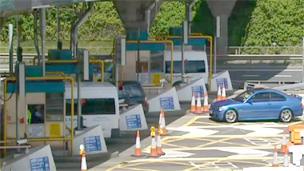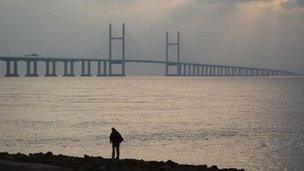Severn bridges toll fee cut hopes hit by £88m debts
- Published

It costs £6.20 to take a car over the M4 and M48 bridges from England to Wales
Hopes have been dashed that Severn bridge toll fees can be reduced soon after the crossings revert to public ownership in about 2018.
It comes amid news the UK government has amassed about £88m debt due to extra operation and maintenance costs.
The Welsh Affairs Committee says the "magnitude" of the debt will result in further delays in cuts in fees.
The UK Department for Transport said outstanding debts could take a further two years to recover.
The bridges are run by a private company but the Welsh government said this week that it wants to take control when they return to public ownership, an issue yet to be agreed with the UK government.
In March the Welsh Affairs Committee renewed its calls for the tolls to be reduced when the concession ends in 2018.
However, during its inquiry on cross-border road and rail links, external it was informed that "accumulated deficit recoverable from tolls" had risen to £112m by the end of March 2012, up from £19m in 2010, which led to calls for a fuller explanation.
Now, a detailed breakdown of the costs, external provided by Transport Minister Stephen Hammond shows the forecast has reduced to £88m, which he says will take a further two years to recover.

The M4 and M48 bridges over the Severn are used by about 80,000 vehicles every day
The costs fall outside the deal with the current operator and include £40m of operational expenditure, including £16m for further strengthening work, as well as £8m for resurfacing of the M48.
The M4 and M48 bridges are operated by private company Severn River Crossings Plc and used by about 80,000 vehicles every day.
The company's concession will end and the bridges will return to the UK government when takings from the tolls reach £996m at 1989 prices, which is estimated to happen in about 2018.
Committee chair David Davies said: "We were hugely disappointed that the government did not make clear during our 2010 inquiry on the Severn crossings toll that the debt could increase by such an order of magnitude, to such a level.
"We were also concerned that the accumulation of such a high level of debt would delay the reduction in the level of the tolls that we have repeatedly called for.
"The tolls are detrimental to the Welsh economy, which depends on links across the border, and there are negative 'side effects' such as the diversion of heavy traffic through smaller, residential roads."
It costs £6.20 to take a car over the bridges from England to Wales. Driving into England is free. The tolls for vans and minibuses are £12.40 and for lorries and coaches is £18.60.
The UK Department for Transport said: "The debt that remains outstanding at the end of the private concession must be recovered.
"This has been the case since 1992 and the legislation is clear that the tolls can only be used for the purpose of paying the costs of building, maintaining and operating the bridge."
A report, external for the Welsh government last year said abolishing the tolls would increase traffic by an estimated 12% - equivalent to about 11,000 vehicles a day.
It found businesses and commuters spend £80m a year crossing the bridges.
- Published13 May 2013
- Published15 March 2013
- Published6 March 2013
- Published1 January 2013